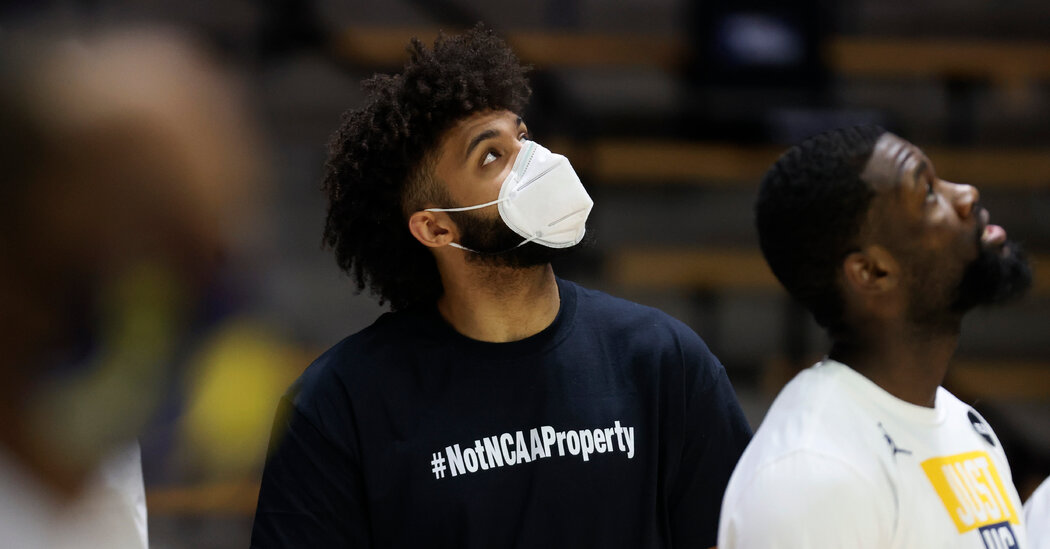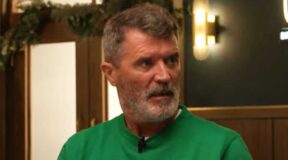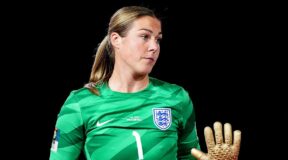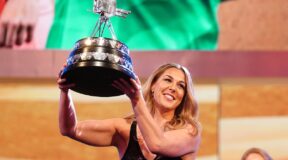INDIANAPOLIS — One of the myriad ways in which this N.C.A.A. men’s basketball tournament is different occurred in the wee hours of Saturday morning. Jules Bernard IV, a starting guard for U.C.L.A., had been vomiting and feverish in his downtown hotel room much of the night and his status for his team’s national semifinal game against Gonzaga was in doubt.
In normal times, his mother, Kristene, would have been at his side, curling his hair in her fingers and calling him by one of the pet names she’d given him since he was a boy. But she was in Vancouver, British Columbia, working on a film as a makeup artist and could not leave Canada without having to quarantine for two weeks upon returning.
Neither could Bernard’s father, Jules III, or his younger sister, Sophia, be there to comfort him, barred from having any close contact with anyone from the team’s 34-person traveling party. “We’re a very tactile family,” said the elder Bernard, who recalled holding his son’s hand on their walks to school in sixth grade. “There’s a lot of loving, a lot of hugs. We’re a very huggy group of people.”
Instead, Bernard’s father and sister, after scouring the city’s all-night pharmacies for flu medicine, dropped off a package at the hotel that a team manager retrieved. They learned the next day that Jules IV had been struck with food poisoning and had not contracted the coronavirus. (His tests came back negative.) “I don’t know if there was any exaggerated concern,” Jules III said. “My wife and I were just please, please, please.”
His son, who woke up with chills, was given intravenous fluids at least twice Saturday — including during the first semifinal game between Baylor and Houston — and played during the Bruins’ epic overtime loss to Gonzaga, his performance hampered less by illness than foul trouble.
Bernard’s travails, though, underscore the extraordinary measures the N.C.A.A. put in place — and the extreme burden placed on athletes — to conduct a men’s basketball tournament that is worth $850 million in television revenue alone after it was canceled last March in the early stages of the coronavirus pandemic.
Athletes have been overwhelmingly grateful for the opportunity to play, but the measures put in place for the men’s and women’s tournaments — quarantining upon arrival, frequent testing, isolating teams in hotels and cutting off contact with even their families — have highlighted a fundamental inequity of the college sports industry: players are not paid for their labor.
When the men’s players arrived in Indianapolis they found a book in their room — Jesse Washington’s biography of the late Georgetown coach John Thompson — and teams could schedule an hour of free time at the nearby minor-league ballpark where they could play cornhole, kick a soccer ball, toss a football or swing a whiffle ball bat in the outfield.
The imagery was hard to ignore.
“When we go to the games, it’s like we’re in jail and we get out,” Adrian Autry, an assistant coach at Syracuse, told the Syracuse Post-Standard.
The environment allowed players to increasingly see themselves as essential employees.
By virtue of being congregated in one city — San Antonio for the women, Indianapolis for the men — they have been more easily able to direct attention to the inferior resources for the women’s tournament and launch a #NotNCAAProperty social media campaign that is trying to apply political pressure on the N.C.A.A. to loosen restrictions on athletes cashing in on their fame.
That proximity allowed Iowa’s Jordan Bohannon and Rutgers’ Geo Baker, who are among the leadership in the name, image and likeness campaign, to corner Virginia Tech’s Wabissa Bede and cajole him into joining their movement. Their teams were in different parts of the bracket, so normally they might have been playing in three different cities.
“Everything kind of slowed down for me because the whole time in the bubble, you don’t really do much,” Bede said, adding that with little else to do but homework, he gave more thought to issues that are important to college athletes. “The biggest thing is how athletes have got to use our voices a lot more and I think that’s what we’re doing right now.”
Bede had a relatively short stay in Indianapolis, about one week, because Virginia Tech lost to Florida in the opening round. Although teams are often sent home after losses, there was added urgency to doing so this year. Oregon State, for example, arrived back at its hotel after losing to Houston in the round of 8 last Monday night, then learned that it had to pack up its belongings and be on a 1:15 a.m. charter flight to Eugene, Ore.
U.C.L.A. was at least able to fly back to Los Angeles on Sunday. But the players remained isolated, unable to meet with their families to ensure they did not infect the teams that would be playing on Monday night, Gonzaga and Baylor.
It was a protocol to which the players had become accustomed. Johnny Juzang, U.C.L.A.’s star in the tournament, had been surprised earlier by his older brother Christian, who flew in from Vietnam, where he has been playing, to drop off food. They had not seen each other since last summer. But instead of sharing hugs, they talked on their phones through a double set of glass doors at the team’s hotel.
Bernard’s father said the routine had been the same with his son in Indianapolis, and since the start of the season. During the season, he often dropped groceries off for his son, meeting him in the driveway outside his apartment building near Westwood. And the adherence by the rest of the team seemed to work — they have not had a positive virus test all year, the elder Bernard said.
But it did make for a dissonant scene on Sunday: as Jules Bernard III drove to the airport with his daughter, they were connected by FaceTime to Kristene in Vancouver and their son at the team hotel. “He was waving to us from inside the dark lobby,” he said.
Source: Read Full Article






